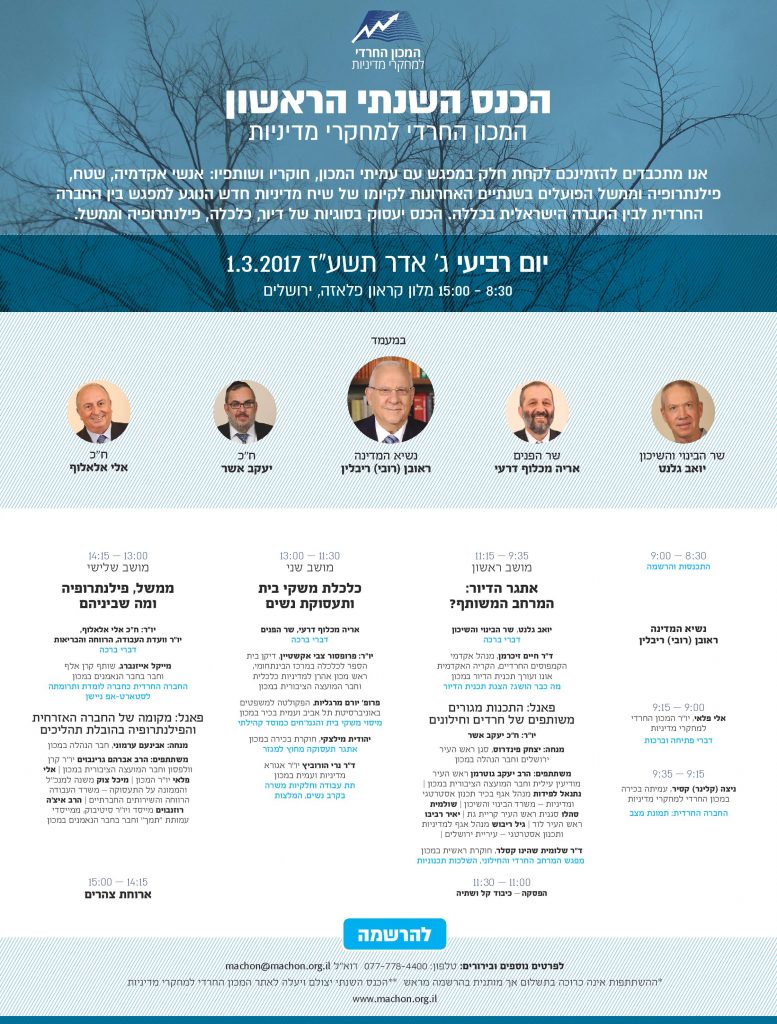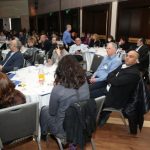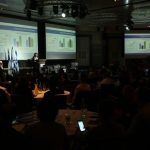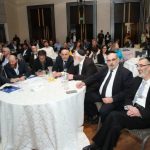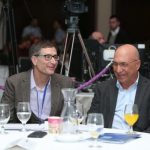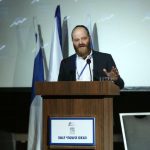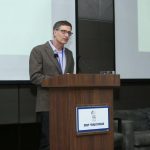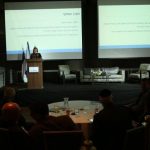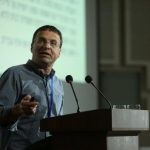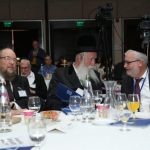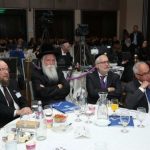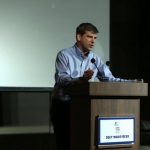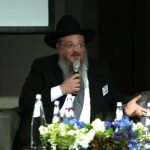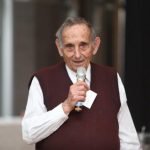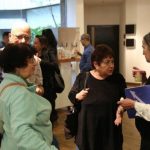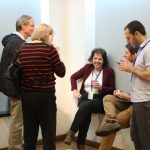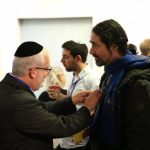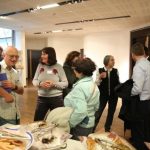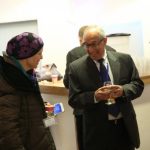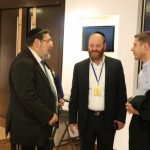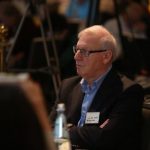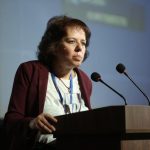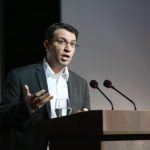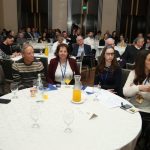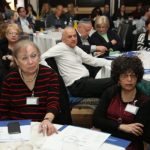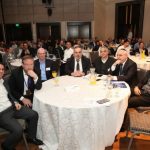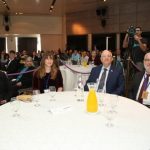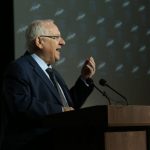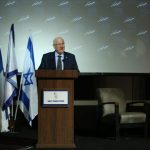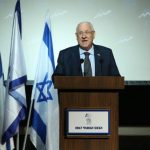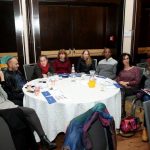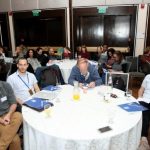First Annual Conference of the Haredi Institute for Public Affairs
With the participation of: President Reuven Rivlin, Construction and Housing Minister Yoav Galant, Interior Minister Aryeh Deri, MK Yaakov Asher, MK Eli Alalouf
Introductory Remarks, Chairman Eli Paley
The opening session of the conference was introduced by the Institute’s founding chairman Eli Paley, who posed the question being asked by researchers and which concerns the social definition of who is “Haredi”? “My understanding is that the definition of ‘who is Haredi’ is anyone for whom Torah is the central value in life,” Paley said, and on this basis he educates his children.”
Paley welcomed President of Israel Reuven Rivlin to address the audience with opening remarks, and spoke of the principles that guide the Institute’s work. These principles, he said, are aligned with the principles the President set forth in his “four tribes” speech delivered at the Herzliya Conference two years ago, where he called upon the Israeli public to strive for full collaboration between all sectors and minorities in Israel. We should strive for partnership born of responsibility, for policy that is based on fairness and equality, and most importantly the confidence that such partnership will be premised on maintaining each sector’s identity. Such partnership is only feasible if we are confident that it will not detract from the core values of the Haredi world.”
Opening Address, President Reuven Rivlin
President of Israel Reuven (Ruby) Rivlin delivered the opening address at the conference and expressed his appreciation and esteem for the Institute’s founder. Rivlin opened his remarks by saying the name of the Institute twice, explaining to the audience that the Institute’s name itself is an innovation that should draw our attention. “I am more than delighted about this conference of the Haredi Institute for Public Affairs,” he said. “I must say, just mentioning the name of the Institute raises eyebrows among people who aren’t familiar with it.”
The President further noted the State’s commitment to preserving the identity and unique character of the Haredi community. “I see you as the successors of the groundbreakers of the Old Yishuv.” Rivlin said, “You don’t compromise on your identity and you know how to be trailblazers who expand the borders of Jerusalem. I believe that the State of Israel should allow anyone who wants to learn to do so. To support those who learn Torah is a privilege and is part of the values of the State. At the same time, it’s clear that policy must be devised. In the present reality, it’s unclear who needs who: is the Haredi community in need of the State or is the State in need of the Haredi community’s integration?”
“Data, the Story Behind Them”, Vice Chair Nitsa (Kaliner) Kasir
Nitsa (Kaliner) Kasir, senior fellow at the Haredi Institute for Public Affairs, delivered a presentation at the opening session of the conference. Kasir presented data concerning poverty rates in the Haredi community in comparison to the poverty rate in general society. The data showed that even though the poverty rate in Haredi society is over 50% and in the general population it is 8.9%, the percentage of people who answered in the affirmative to the question “Have you ever thought of yourself as poor?” was very similar among people in the Haredi community and in general society, and stands at 37%.
Kasir explained that being on the margins of society typifies poverty in the general population, whereas this is almost entirely irrelevant in the Haredi community, where poverty is perceived as a value of living modestly. “Torah study is a key factor because someone who is poor because he has chosen to learn Torah is perceived as having a higher status in society. Poverty is perceived as living modestly.”
To download the presentation Data, The Story Behind Them, and the Haredi Institute for Public Affairs
—
Session I: The Housing Challenge – The Question of Common Space
Dr. Haim Zicherman
Minister of Construction Yoav Galant
MK Yaakov Asher
Political power is important, but it is not enough and can’t bring about optimal results.
Aryeh Deri, Minister of Interior and Development of the Negev and Galilee
Session II: Household Economies and Women’s Employment
Professor Zvi Eckstein
Thanks to Torah study and large families, Haredi society is the happiest of them all.
Yisrael Tick
Professor Yoram Margalioth
Yehudit Miletzky
Dr. Neri Horowitz
Haredi Women’s Employment: The Miracle That Wasn’t
Session III: Government, Philanthropy and Everything in Between:
MK Elie Elalouf
Anyone wishing to link modern philanthropy with government, I suggest he learn from Haredi society.
Michael Eisenberg
This conference is most welcome, and many more should be convened.
Video: Yehuda Grovais

Photo: Eli Cobin
Eli Paley: ‘Haredi’ is anyone for whom Torah is the central value in life
https://www.youtube.com/watch?v=vFb7GUOPoco&feature=emb_title
“Data, the Story Behind Them”, Vice Chair Nitsa (Kaliner) Kasir
https://www.youtube.com/watch?v=Yn5Qe5fI01s&feature=emb_title
President of Israel Reuven (Ruby) Rivlin: It’s unclear who needs who: is the Haredi community in need of the State or is the State in need of the Haredi community integration?”
https://www.youtube.com/watch?v=Bqzb6wVjVeQ&feature=emb_title
Session I: The Housing Challenge – The Question of Common Space
Dr. Haim Zicherman: It is inconceivable that Beer Sheva will receive 30,000 new housing units under the ‘roof agreement’ and the mayor will object to Haredim taking up residence in the city.
https://www.youtube.com/watch?v=CIk9J3QDPoA&feature=emb_title
Minister of Construction Yoav Galant: The origins of Zionism are rooted in the love of Eretz Yisrael and the prayers for the return to Zion uttered by Jews throughout thousands of years of exile.
https://www.youtube.com/watch?v=z80q77YR8Gw&feature=emb_title
MK Yaakov Asher: Political power is important, but it is not enough and can’t bring about optimal results.
https://www.youtube.com/watch?v=osNko6W0u2o&feature=emb_title
Aryeh Deri, Minister of Interior and Development of the Negev and Galilee: Twenty years ago my late friend Zev Wolfson o.b.m. and I wanted to establish a research center focused on Haredi society.
https://www.youtube.com/watch?v=cpY17Jb4tYE&feature=emb_title
Session II: Household Economies and Women’s Employment
Professor Zvi Eckstein: Thanks to Torah study and large families, Haredi society is the happiest of them all.
https://www.youtube.com/watch?v=MUv4v2Qzv3g&feature=emb_title
Yisrael Tick: I saw an educational system with tens of thousands of students, running by sheer miracles. This motivated me to join the Haredi Institute, to formulate operational procedures that would be suitable to the system.
https://www.youtube.com/watch?v=4v-LwnCYhpQ&feature=emb_title
Professor Yoram Margalioth: The field of gemachim (free-loan societies) made me understand the importance of the Institute’s activities.
https://www.youtube.com/watch?v=A8VMeVrwpIE&feature=emb_title
Yehudit Miletzky: Haredi women feel a sense of mission – to represent the Haredi world in heterogeneous work environments.
https://www.youtube.com/watch?v=uER0qdf_IBg&feature=emb_title
Dr. Neri Horowitz: Haredi Women’s Employment: The Miracle That Wasn’t
https://www.youtube.com/watch?v=ulpWYzfsPcc&feature=emb_title
Session III: Government, Philanthropy and Everything in Between:
MK Elie Elalouf: Anyone wishing to link modern philanthropy with government, I suggest he learn from Haredi society.
https://www.youtube.com/watch?v=cTK4Yxz3SUU&feature=emb_title
Michael Eisenberg: This conference is most welcome, and many more should be convened.
https://www.youtube.com/watch?v=6GL0g6XRUbk&feature=emb_title
Video: Yehuda Grovais

